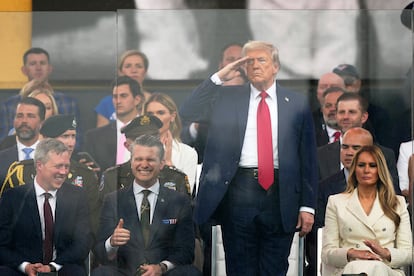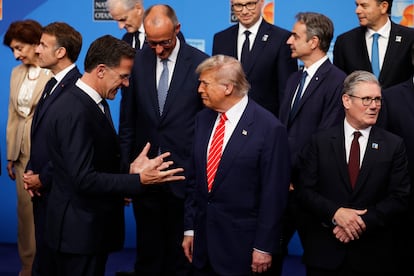‘Daddy’ diplomacy: Donald Trump turns allies into vassals
World leaders are trying to find the right dose of flattery and tact in their relationship with the Republican to avoid getting on his bad side
During the recent NATO summit in The Hague, most of the leaders present had the same priority: with the United States threatening to disengage from the Atlantic Alliance, it was crucial to keep President Donald Trump happy. At any cost. Even at the expense of their own dignity, as NATO Secretary General, Mark Rutte, made clear. “You are flying into another big success in The Hague [...] Europe is going to pay in a BIG way, as they should, and it will be your win,” Rutte assured Trump in a private message that the Republican did not hesitate to share on social media. Later, in an obsequious joint appearance before the media, Rutte even called him “daddy.”
Rutte has so far probably been the most extreme example of flattery diplomacy — bordering on outright vassalage — in response to Washington’s constant threats on trade and defense. But he is neither the only one to do so, nor is this tactic new: Trump has always been exceptionally receptive to praise and grand gestures, ever since his first term. French President Emmanuel Macron knows this well; he impressed Trump so much with the Bastille Day military parade during his first state visit in 2017 that Trump had been trying ever since to organize one of his own, in his own honor. He finally managed to do so shortly before traveling to The Hague — an event that coincided with his birthday.

Since the Republican’s return to power this past January, unreserved flattery has become a key ingredient in the approach — both domestically and for many world leaders, from allies to adversaries — to dealing with the volatile U.S. president. Russia’s Vladimir Putin showers him with superlatives. The Pakistani government has nominated him for the Nobel Peace Prize. Finnish President Alexander Stubb traveled to Florida solely to play golf with him. And on his first visit to the White House, British Prime Minister Keir Starmer brought a secret weapon in hopes of persuading Trump to exempt the United Kingdom from the tariffs he ended up imposing indiscriminately: a personal letter from King Charles III, inviting him for another state visit to London, following the one he made in 2019.
Also in The Hague, where everything revolved around the Republican’s tastes and moods, Trump slept in the Huis ten Bosch royal palace, the official residence of the Dutch Royal Family.
“Nothing impresses more than the current European leadership’s inexhaustible capacity to humiliate themselves so as to retain the right to be Trump’s vassal,” former Greek finance minister Yanis Varoufakis joked on the social network X after the NATO meeting.
Courtesy and special touches — such as the Cristiano Ronaldo jersey signed and dedicated by the Portuguese player with the phrase “playing for peace” that European Council President António Costa gave to Trump during the recent G-7 summit in Canada — have always been part of the diplomatic game. The question is: where is the line between that and servility?
“The question of how to approach this U.S. administration has European and other leaders truly confused,” says former U.S. diplomat Ian Lesser. “It’s further complicated by the fact that President Trump seems to view the world, above all, through the lens of personality and personal interactions,” explains the analyst at the transatlantic think tank German Marshall Fund.
The Gulf monarchies have turned flattering Trump into almost an art form. During his visit in April, Saudi Arabia and the United Arab Emirates sent F-16 escorts as the Republican entered their respective airspaces. There were also camel parades. And numerous announcements of multi-billion-dollar purchases of U.S. products. Qatar went the furthest, gifting Trump a luxury Boeing valued at $400 million, for him to use as his presidential aircraft, Air Force One. It is, by far, the most expensive — and controversial — gift ever received by a U.S. president in the country’s nearly 250-year history.
Flattery tactics are not exclusive to world leaders either: even the world’s wealthiest businessmen, whether Mark Zuckerberg or Elon Musk, have agreed to play along.
“Trump doesn’t want loyalty, which is a virtue. He wants vassalage, which is very different. People who will say yes to him, not advisers who present him with different points of view, pros and cons, and can advise him to do things differently than he wants,” Trump’s former national security adviser, John Bolton, remarked in a recent interview with this newspaper.
Those who lacked the knack or refused to flatter him have been publicly humiliated by the Republican. The scolding of Ukrainian President Volodymyr Zelenskiy in the Oval Office was broadcast live to the entire world. After the NATO summit, Spanish Prime Minister Pedro Sánchez also joined the list of leaders berated by the head of the world’s leading power. In his case, with threats worthy of Vito Corleone: “The [Spanish] economy [is] doing very well, and that economy could be blown right out of the water with something bad happening,” Trump said after Sánchez refused to adopt the defense spending target of 5% of GDP agreed upon in The Hague.

Meanwhile, Britain’s Starmer signed a tariff exemption with Trump two weeks ago for his country’s aerospace industry, along with significantly reduced tariffs for the automotive sector. And Rutte secured a public statement from Trump declaring he is “100%” committed to NATO, after previously casting doubt on Article 5 regarding mutual defense. Macron, too, has fared well by treating Trump with the highest honors. “He allows him to call him when necessary and pass messages,” notes Célia Benin, head of the Paris office of the European Council on Foreign Relations (ECFR) and an expert on transatlantic relations.
But is extreme flattery the only way to deal with Trump? No, says Comfort Ero, president of the International Crisis Group (ICG). Ero recently published an analysis in which she noted that there are leaders, such as Mexico’s Claudia Sheinbaum or Canada’s Mark Carney, who have managed to stand firm without provoking Trump’s wrath. “Flattery works, but Trump often also respects people standing their ground. The worst seems to be objecting loudly but doing nothing about it,” she wrote.
“The art of diplomacy requires understanding who’s on the other side and also requires different skills, knowing how to combine flattery with a firm hand, depending on the negotiations,” Ero notes in a telephone conversation. “And it also requires understanding the person’s psychology and character, their way of thinking.”
According to Lesser, “the issue of flattery is likely to be put to the test now” in the final stage of the tense trade negotiations between Washington and the EU. And on this front, Benin says, “Europe should not be afraid to stand firm, because Trump respects strength, like the strength China has also shown in trade matters.” Moreover, Benin adds: “Trump has always treated even his friends badly.”
South African President Cyril Ramaphosa learned the hard way that flattery does not automatically lead to success. He went to the Oval Office in May to explain to Trump that — contrary to the U.S. president’s strong beliefs — there is no genocide of white farmers happening in his country. He arrived with a book of photographs related to golf, the Republican’s favorite sport, lots of smiles, and a determination to be patient. Ramaphosa even brought along two South African world golf champions, Ernie Els and Retief Goosen.
But it was to no avail, and the meeting turned into an ambush, with Trump presenting dubious news sources and a video containing incorrect data and images, attempting to prove that yes, white farmers in South Africa are an oppressed minority who are being systematically murdered.
Not even getting the right dose of flattery guarantees anything. “Trump is volatile, even with those who flatter him. He can turn on an ally without warning,” warns Brazilian political scientist Oliver Stuenkel, who points out that, despite the fact Trump had a close relationship with the right-wing Brazilian president Jair Bolsonaro (2019-2022), during his first term, “Trump imposed tariffs on Brazilian steel without warning.”
That’s why, he adds, it’s best to be very cautious with this diplomacy of vassalage: “It may avoid a one-off crisis, but it doesn’t generate trust or predictability in the medium term,” he emphasizes. “It’s a fragile diplomacy, which depends more on the mood of a single person than on lasting institutional agreements,” he adds. And if everyone knows one thing — flatterers and non-flatterers alike — it’s that Trump’s mood changes faster than the weather.
Sign up for our weekly newsletter to get more English-language news coverage from EL PAÍS USA Edition
Tu suscripción se está usando en otro dispositivo
¿Quieres añadir otro usuario a tu suscripción?
Si continúas leyendo en este dispositivo, no se podrá leer en el otro.
FlechaTu suscripción se está usando en otro dispositivo y solo puedes acceder a EL PAÍS desde un dispositivo a la vez.
Si quieres compartir tu cuenta, cambia tu suscripción a la modalidad Premium, así podrás añadir otro usuario. Cada uno accederá con su propia cuenta de email, lo que os permitirá personalizar vuestra experiencia en EL PAÍS.
¿Tienes una suscripción de empresa? Accede aquí para contratar más cuentas.
En el caso de no saber quién está usando tu cuenta, te recomendamos cambiar tu contraseña aquí.
Si decides continuar compartiendo tu cuenta, este mensaje se mostrará en tu dispositivo y en el de la otra persona que está usando tu cuenta de forma indefinida, afectando a tu experiencia de lectura. Puedes consultar aquí los términos y condiciones de la suscripción digital.








































